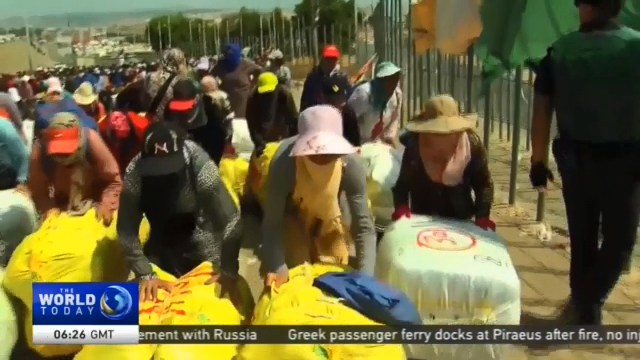
14:51, 29-Aug-2018
Mule Women: People bear heavy loads across border to Morocco for duty-free import
Updated
13:59, 01-Sep-2018
02:47

Now we're bringing you stories about the ties and tensions that exist between North Africa and southern Europe. In recent months migrants seeking asylum or a better life in the west have brought the relationship between the two continents into sharp focus. But, as Al Goodman reports from the Spanish enclave of Melilla, there's a daily migration that goes almost unreported and it's all about a lucrative border trade that thrives on the shoulders of Moroccan women.
Bearing the weight. In the stifling summer heat. They're called Moroccan "mule women", leaving Europe, at the Spanish city of Melilla, crossing with heavy parcels: new and used clothing, household goods, electronic devices. For import across the fence in Morocco - duty free - because it's considered hand-luggage. They earn only about seventeen dollars for each load. And not all of them make it. This Moroccan from just across the fence in Morocco, overcome by the heat. Her parcel, no where to be seen. Now it's not about commerce; just her health that's at stake.
ALAN GOODMAN MELILLA, SPAIN "A fault line between wealthy Europe and economically aspiring Africa is right here at the border of Spain and Morocco. Many here, in a daily struggle for survival."
Like this Moroccan, who's toiled here for 24 years. She has nine children to feed, and a swollen neck that bothers her.
FATIMA ZOHRA MOROCCAN WORKER "Everything hurts me. I have headaches. I want to go to see a doctor. But I can't afford it."
This woman, with three children, also suffers, but says there aren't enough jobs in Morocco. Her husband also works here.
RAJAE LADLI MOROCCAN WORKER "The owner of the merchandise, the owners, they earn a lot. Sure. But we don't."
Spain's port of Melilla, on Morocco's north coast, imported about 500 million dollars in goods last year. Most of it, destined for Morocco. Lucrative for traders on both sides of the border, officials say. Spain's top official in Melilla just took office, as the first Muslim woman on the job, and says "mule women" are a concern.
SABRINA MOH ABELKADER SPAIN'S TOP OFFICIAL IN MELILLA "The conditions are not ideal. They haul very heavy loads. We're looking at the situation, to see what might be changed."
But this Melilla businessman complains recent restrictions on border trade caused a sharp drop in business.
NOURDINE AHMED HASSAN MELILLA TRADERS ASSOCIATION "They need to increase the number of trips by the hand porters, or get those goods through in a different way."
Some porters complain they used to make two trips a day; now just one. Spanish Civil Guards say that reduces injuries. Still, 3000 porters every Monday to Thursday come here, enduring long waits until it's their turn. To cross from Spain into Morocco and earn some cash for their families. Al Goodman, Melilla, Spain.

SITEMAP
Copyright © 2018 CGTN. Beijing ICP prepared NO.16065310-3
Copyright © 2018 CGTN. Beijing ICP prepared NO.16065310-3